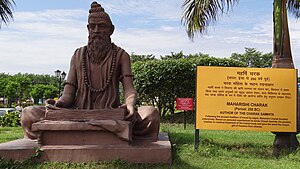Note: This is a project under development. The articles on this wiki are just being initiated and broadly incomplete. You can Help creating new pages.
Difference between revisions of "Charaka Samhita"
Chaithrika (talk | contribs) (Created page with "thumb|right|'''Charaka''' Charaka Samhita is the most ancient works of ayurveda. It is considered the original reference book of holistic ayurvedic medici...") |
Chaithrika (talk | contribs) (+adding internal link) |
||
| Line 1: | Line 1: | ||
[[File:Charak.jpg|thumb|right|'''Charaka''']] | [[File:Charak.jpg|thumb|right|'''Charaka''']] | ||
| − | Charaka Samhita is the most ancient works of ayurveda. It is considered the original reference book of holistic | + | Charaka Samhita is the most ancient works of ayurveda. It is considered the original reference book of holistic [[Ayurvedic medicine]]. |
The Charaka Saṃhitā or Compendium of Caraka (Sanskrit चरक संहिता IAST: Caraka-saṃhitā) is a Sanskrit text on Ayurveda (Indian traditional medicine). Along with the Suśruta-saṃhitā, it is one of the two foundational Hindu texts of this field that have survived from ancient India | The Charaka Saṃhitā or Compendium of Caraka (Sanskrit चरक संहिता IAST: Caraka-saṃhitā) is a Sanskrit text on Ayurveda (Indian traditional medicine). Along with the Suśruta-saṃhitā, it is one of the two foundational Hindu texts of this field that have survived from ancient India | ||
| Line 7: | Line 7: | ||
==About== | ==About== | ||
| − | The Charaka Samhita states that the content of the book was first taught by Atreya, and then subsequently codified by Agniveśa, revised by Caraka, and the manuscripts that survive into the modern era are based on one edited by Dridhabala. | + | The Charaka Samhita states that the content of the book was first taught by Atreya, and then subsequently codified by Agniveśa, revised by Caraka, and the manuscripts that survive into the modern era are based on one edited by Dridhabala.Dridhabala stated in the Charaka Samhita that he had to write one third of the book all by himself because this portion of the book had been lost, and that he also re-wrote the last part of the book. |
==Period== | ==Period== | ||
Latest revision as of 12:08, 20 June 2017
Charaka Samhita is the most ancient works of ayurveda. It is considered the original reference book of holistic Ayurvedic medicine.
The Charaka Saṃhitā or Compendium of Caraka (Sanskrit चरक संहिता IAST: Caraka-saṃhitā) is a Sanskrit text on Ayurveda (Indian traditional medicine). Along with the Suśruta-saṃhitā, it is one of the two foundational Hindu texts of this field that have survived from ancient India
Contents
About
The Charaka Samhita states that the content of the book was first taught by Atreya, and then subsequently codified by Agniveśa, revised by Caraka, and the manuscripts that survive into the modern era are based on one edited by Dridhabala.Dridhabala stated in the Charaka Samhita that he had to write one third of the book all by himself because this portion of the book had been lost, and that he also re-wrote the last part of the book.
Period
Composition of Charaka Samhita are uncertain. Meulenbeld’s History of Indian Medical Literature dates it to be between fourth century BCE to the second century CE, with Caraka's compilation likely between 100 BCE and 200 CE. The Dṛḍhbala revision and completion, the source of current texts, is dated to the 6th century CE.
Chapter
- General principles
- Pathology
- Anatomy
- Sensory organ based prognosis
- Therapeutics
- Pharmaceutics and toxicology
- Success in treatment
